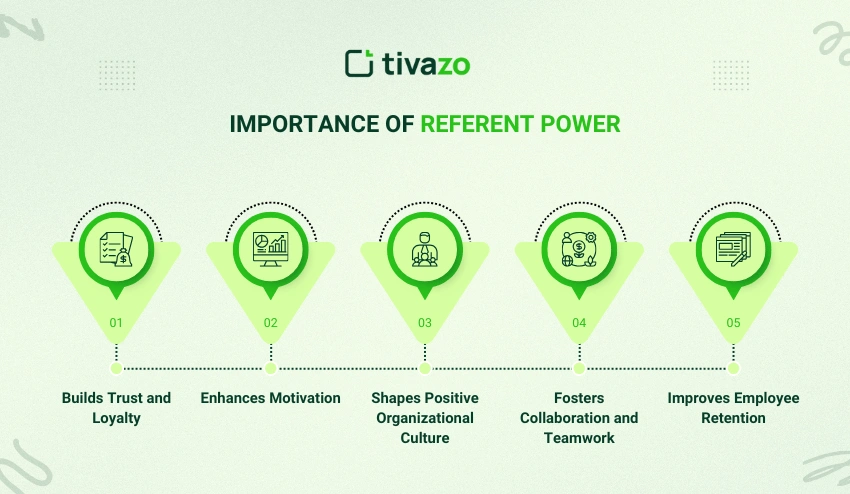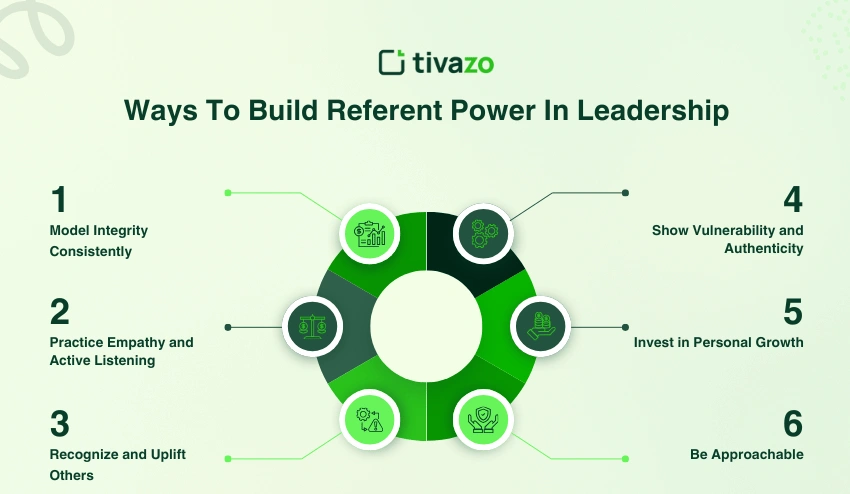Why are certain leaders able to inspire loyalty and trust easily, and others are unable to receive even basic respect? The solution can usually be referent power, which is a type of power that is not based on authority or incentives but on respect and actual attachment.
In comparison with the coercive or reward-based strategies, referent power in leadership is based on credibility, authenticity, and the possibility of establishing trust. That is what makes employees follow somebody because they want to follow, rather than because they must. Such a kind of influence is crucial in modern workplaces where teamwork, respect, and healthy interpersonal relationships are more important than hierarchy.
This article will discuss what referent power is, why this power is so important in leadership and management, and how this power influences organizational culture. You will also get to know some of the practical ways of developing referent power at the workplace and a comparison of referent power with expert power in the real world.
What is Referent Power?
Referent power is a type of leadership influence that comes from admiration, respect, and personal charisma rather than formal authority or position. Leaders with referent power inspire others to follow them because employees identify with their values, behavior, and character.
In a wider meaning, referent power in leadership influences the culture in the workplace because it brings in trust, loyalty, and motivation. It promotes voluntary following, and team members exceed expectations because they truly respect and desire to imitate the leader. In contrast to coercive or reward-based power, referent power develops long-term power and strengthens cooperation, involvement of employees, and relationships among people in the organization. At the corporate offices of New York, in a technology startup in Silicon Valley, leaders in industries use referent power to build high-performing, cohesive teams.
What is Referent Power In Leadership?
Referent power in leadership means that a leader is able to have power due to the fact that the members of the team admire, respect, and identify with him. It does not depend on authority or job position or rewards as opposed to positional or coercive power. Leaders who have high referent power make employees loyal and motivated by their credibility and authenticity, and ethical conduct. This kind of influence is essential in contemporary organisations, whereby team success depends on teamwork, interactions, and relationships with others.
In real life, referent power influences organizational culture by fostering trust, commitment, and voluntary followership. When leaders are able to show integrity, empathy, and act in a consistent manner, the followers will automatically be drawn to them and will desire to do the same. The studies indicate that in the workplace, where leaders employ referent power successfully, employee engagement levels are higher, communication is improved, and team cohesion is enhanced. With referent power, which is combined with other leadership styles, including expert power or transformational leadership, managers can establish a favorable and high-performing workplace environment.
Why Is Referent Power Important?
Referent power is a very important aspect of leadership in the sense that it causes influence not with authority or rewards but with respect, trust, and admiration. Leaders who build referent power provide conditions in which workers are willing to follow and give their best towards their work.

1. Builds Trust and Loyalty
Leaders who possess referent power are trusted since their actions are always in line with what they say and what they uphold. Such trust will motivate the team members to feel safe, express themselves freely, and trust their leader to lead them and create a culture of loyalty and teamwork.
Whenever there is high referent power in workplaces, employees tend to remain devoted to projects and the organization. Based on the organizational behavior research, trust and respect that are created by referent power enhance employee engagement, decrease turnover, and offer a long-term retention advantage.
2. Enhances Motivation
Referent power in leadership is intrinsically motivating to the employees in that they are motivated by admiration and identification with the vision of the leader and not by monetary rewards or coercion. Inspirational leaders lead by example, which motivates employees to be engaged because they make them feel special and part of the bigger picture.
Leader-teams that have a high referent power tend to be more productive and innovative. Employees who feel identified with their leaders are more ready to take initiative, give ideas, and accept challenges, leading to better overall performance.
3. Shapes Positive Organizational Culture
Leaders who possess referent power shape organizational norms and behaviors by setting examples of integrity, empathy, and professionalism. Their case is a role model in interpersonal relations, teamwork, and ethical decision-making in the workplace.
The result of this kind of leadership is a supportive and inclusive atmosphere in which employees feel respected and appreciated and are motivated to copy positive behaviors of the leader. In the long run, referent power will assist in the establishment of a viable culture that will attract and retain the best talents.
4. Fosters Collaboration and Teamwork
Referent power inherently makes teamwork work better since employees like and admire leaders who take their input into consideration. Empathic and authentic leaders provide psychological safety, and team members can work together more easily.
Studies indicate that teams headed by referent-oriented leaders have an easier time communicating, there are minimal conflicts, and more participation in group projects. Leaders will be more successful in their work and the relations between each other by encouraging a situation of voluntary cooperation instead of using formal power.
5. Improves Employee Retention
Workers will feel motivated to stay longer in an organization where they are respected and feel they are truly interested in their leader. Referent power enhances loyalty since individuals desire to be associated with leaders whom they admire and trust.
Workplace research indicates that the lower the relational leadership and referent power within an organization, the reduced the voluntary attrition and the higher the job satisfaction. Leaders who develop this type of influence have environments in which employees are encouraged to work and contribute in the long term.
How To Build Referent Power In Leadership
Development of referent power is a strategic activity that depends on repeated actions, authenticity, and sincere interaction with members of the team. Leaders who aim at building this type of influence will be able to influence their teams to be loyal, trusting, and voluntarily following.

1. Model Integrity Consistently
Integrity is the basis of referent power in leadership. When leaders behave in accordance with the values they have stated, they are respected and admired, thus their influence becomes stronger. Integrity is not just honesty; it is always to show ethical choices and dependability in daily activities.
Workers are quick to detect discrepancies between behavior and words. Integrity in leaders inculcates a culture of trust in which team members are free to take initiative and work towards organizational objectives. Organizational behavior studies have found that integrity is among the most influential factors of long-term leadership impact.
The interpersonal relationships and the involvement of employees are also boosted with modeling integrity. Finding a leader who carries out the same ethical and professional standards he believes in regularly makes team members follow the same ethical and professional standards encouraged by the leader, which adds to the referent power of the latter.
2. Practice Empathy and Active Listening
Referent power increases when leaders are capable of being empathetic, and also when they are willing to listen to employees. Being sincerely interested in the opinions of the team members will enhance the level of emotional attachment and respect. Compassionate leaders are able to see the challenges, acknowledge their contribution, and act in a manner that legitimizes the experience of employees.
Active listening will entail thoughtful questioning, recognition, and meaningful response. This conduct promotes free communication and enhanced interpersonal relationships, which are major elements of referent power in the workplace. When there are empathetic leaders, teams are more cooperative and active.
Leaders who are empathetic build a culture of understanding and appreciation of employees. This internal drive increases the level of loyalty, trust, and voluntary followership, which strengthens the impact of the leader throughout the organization.
3. Recognize and Uplift Others
Recognizing the performance and efforts of employees is an important means of establishing referent power. It is visible in publicity and personal appreciation that leaders respect their team, and this brings about admiration and respect and enhances their influence.
Mentoring, guiding, and giving a chance to develop are also some of the ways of uplifting other people. The support of the professional development by the leader indicates a willingness to have his team succeed, and this strengthens the relationships and leads to a willingness to align themselves with the leader.
Leaders reaffirm a good working culture by constantly rewarding efforts and allowing development to occur. This not only makes the leader more engaged and productive, but it also makes him or her an individual that employees would be willing to follow.
4. Show Vulnerability and Authenticity
Authentic and vulnerable leaders become more powerful in terms of referent power. By posting errors, lessons, and personal experiences, leaders become more human and respectful, as well as creating respect and identification in employees.
Being authentic is more than being honest; it is being true to values and acting the same way. Interpersonal relationships and trust are also built, and employees are likely to admire approachable and transparent leaders.
Showing vulnerability fosters psychological safety at the workplace as well. The teams feel free to communicate and share ideas, take calculated risks, and work co-operationally, which enhances the influence of the leader with referent power.
5. Invest in Personal Growth
Referent power leaders are lifelong learners who invest in themselves. This is a promise of growth, and employees will follow suit by adopting the same behaviors, which will increase admiration and respect.
Constant learning also enhances the knowledge, skills, and decision-making skills of a leader, which indirectly contributes to other types of influence, like expert power. Nevertheless, the interpersonal component of referent power is also essential; the approachability, ethics, and empathy of the leader are the factors that spur admiration.
Leaders can build a long-term model of leadership through the integration of personal development and relational power. Not only does this make them more credible, but it also has a positive influence on organizational culture and team performance.
6. Be Approachable
The ability to gain referent power is dependent on accessibility in leadership. Approachable leaders promote open communication and collaboration as well as trust among their team members. Admiration and respect are bound to increase when employees realize that they can approach the leader with any questions or any issues that they may have.
The aspect of approachability is also an indication that leaders care about the relationships and interpersonal links, which strengthens voluntary followership. When they feel heard and supported, teams are more involved, become more active, and are committed to common objectives.
Lastly, friendly leaders empower the culture of the organization through transparency and psychological safety. The referent power is increased as employees are more inclined to share ideas, give feedback, and be aligned with the vision of the leader, in addition to being willing to do so across the entire workplace.
The cultivation of referent power is achieved through hard work, genuineness, and emphasis on establishing meaningful relationships. Leaders who make investments in integrity, empathy, recognition, personal development, and approachability can motivate their teams to be loyal, trusted, and have a long-lasting impact.
Referent Power In The Workplace
Referent power within the workplace is the power that the leaders or the employees hold by virtue of admiration, trust, and respect as opposed to their official authority or titles. Leaders with referent power are able to establish a good atmosphere in which employees join in leadership and willingly follow directions, work together, and participate in organizational objectives. This kind of influence enhances interpersonal relationships and assists in the development of the culture of motivation and responsibility.
Practically speaking, the referent power influences team dynamics and organizational behavior. When employees respect and identify with their leaders, they will be more inclined to engage in decision-making, exchange new ideas with others, and help them. Workplace research has indicated that a team headed by a leader who has high referent power is more engaged, more collaborative, and committed to the values of the company, which is why it is a major success factor in organizations.

In addition, referent power does not only belong to managers or executives; it can also be portrayed by colleagues who act as role models. Employees who are influential and who uphold integrity, empathy, and professionalism continuously will influence their peers and will influence the workplace culture. Through referent power, organizations will be able to increase employee satisfaction, minimize turnover, and create high-performing and unified teams.
Referent Power vs Expert Power
| Aspect | Referent Power | Expert Power |
| Definition | Influence based on admiration, respect, and personal charisma. | Influence based on specialized knowledge, skills, or expertise. |
| Source of Influence | Personal qualities, trust, and ethical behavior. | Professional knowledge, experience, and technical competence. |
| Follower Motivation | Employees follow voluntarily because they identify with or admire the leader. | Employees follow due to confidence in the leader’s expertise or guidance. |
| Impact on Workplace Culture | Builds loyalty, collaboration, and strong interpersonal relationships. | Encourages learning, problem-solving, and technical excellence. |
| Longevity of Influence | Long-term and sustainable when combined with integrity and authenticity. | Dependent on continued expertise and relevance, may diminish if knowledge becomes outdated. |
| Best Used For | Enhancing team morale, engagement, and organizational culture. | Driving decisions, providing guidance on complex tasks, and technical leadership. |
| Example | A manager admired for fairness, empathy, and integrity inspires the team. | A senior engineer whose deep technical knowledge guides project decisions. |
Referent power and expert power often complement each other. Leaders who combine both can maximize influence, build trust, and create high-performing, engaged teams.
Referent Power In Management
Referent power is the powers that help managers to persuade their groups by admiration, respect, and trust instead of their authority or position. Managers who capitalize on referent power encourage employees to voluntarily identify themselves with organizational objectives, resulting in a more engaged and motivated workforce. Such kind of influence improves interpersonal relationships and improves the overall team cohesion.
The referent power is also necessary in developing a positive organizational culture in management practice. Ethical models of behavior, consistency, and authenticity show the example of how managers treat each other, how they work together, and how they make decisions. The workplace studies have indicated that managers who enjoy high referent power enjoy lower employee turnover, higher employee engagement scores, and enhanced team performance than their counterparts who are only positional or coercive.
In addition, referent power enables the managers to be influential, and not to be authoritative. Trust and respect foster open communication, innovation, and problem-solving among the managers in their teams. When workers like and relate to their managers, they are in a better position to share ideas, take initiative, and work together. Essentially, referent power within management enhances the effectiveness of leadership and resilience within an organization.
Referent Power Examples
Referent power is the capacity to affect other people with admiration, respect, and personal credibility as opposed to formal authority. The numerous famous leaders are an example of such influence, and they inspire people all over the world.
1. Steve Jobs
The co-founder of Apple Inc. possessed a huge referent power because of his visionary ideas, his dogged persistence in seeking innovation, and his charisma. His creativity and passion were valued by employees and followers and made them strive to do more, which resulted in groundbreaking products and a culture of excellence.
2. Nelson Mandela
The leadership of Mandela in South Africa is a typical example of referent power. His character of integrity, strength, and conviction in justice, in fact, motivated millions of people to pursue his vision of equality and reconciliation, without the help of coercive power. The fact that he was able to gain respect and admiration resulted in voluntary followership that transformed a nation.
3. A. P. J. Abdul Kalam
Kalam was the humble, knowledgeable, and visionary President of India who inspired the people and students. He was a role model to millions of people since his referent power was founded on personal values, ethical behaviors, and promotion of innovations.
4. Mahatma Gandhi
The influence of Gandhi was purely through referent power. He spearheaded the event of the Indian independence movement by setting an example, practicing ethical leadership, and nonviolent resistance. The referent power of leadership has a long-lasting effect as people respected his ideals and willingly became his followers.
These leaders show that referent power in leadership goes beyond position or authority, it lies within values, credibility, and the capacity to motivate others.
Conclusion
Respect, trust, and credibility of a leader allow them to inspire, motivate, and influence others based on referent power instead of authority or rewards. Whether it be the innovator of the corporation, such as Steve Jobs, the transformational leader, such as Nelson Mandela, A. P. J. Abdul Kalam, and Mahatma Gandhi, history has demonstrated that leaders who build admiration as well as authenticity make a permanent mark and inspire people to follow them willingly.
Leaders can build referent power by applying integrity, empathy, recognition, and approachability to enhance workplace culture, enhance teamwork, and enhance employee engagement and retention. Referent power is sustainable, versatile, and powerful at all organizational levels in contrast to positional power.
Leadership is not about the position as a title, after all, but the skill of influencing people to follow without opposition. With what will you begin to develop your own referent power to influence and bring about some meaningful effect in your team?




